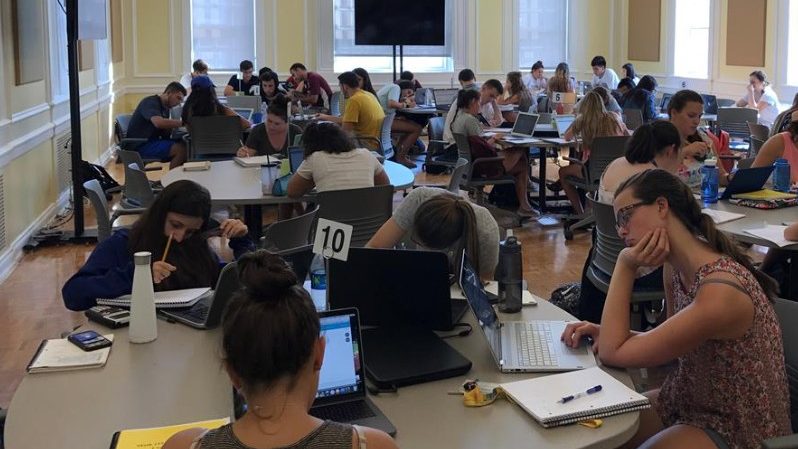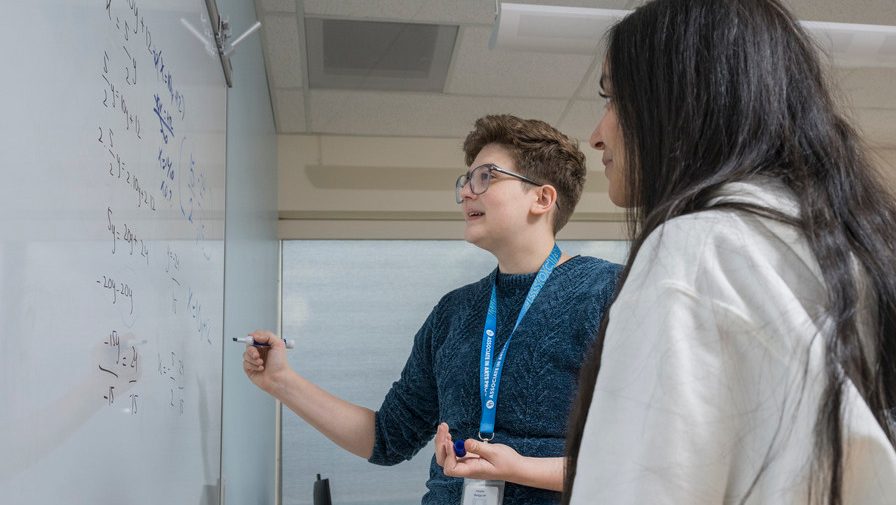
Math 221
Math 221 - Calculus
The information and materials presented here are intended to provide a description of the course goals for current and prospective students as well as others who are interested in our courses. It is not intended to replace the instructional policies and course materials presented in class. Every effort is made to update this information on a routine basis. However, if you have questions about enrollment, purchasing materials, and prerequisite skills, please check with your advisor or instructor.
The most updated Course Description can be found at the UD Course Description Search. Information on the sections currently offered can be found at the UD Course Search. More information can be found on the departmental syllabus.
The procedures and ideas of calculus are fundamental to many disciplines including business and the life sciences. Calculus is sometimes defined as the study of change by examining the nature of space, time, and motion. This course explores the ideas of calculus for those students not intending to go on in the sciences. Our experience has shown that students without appropriate mathematical background do not succeed in this important first semester calculus course. Invariably, unprepared students fall behind because they cannot learn the ideas of calculus while struggling with algebra and precalculus procedures. More about prerequisite skills is discussed below.
The following list illustrates the topics intended for coverage in a typical semester. Your instructor may cover these topics in a different order or may add topics if necessary.
- The Slope of a Curve at a Point
- The Derivative
- Limits and the Derivative
- Infinity and Limits
- Asymptotes
- Differentiability and Continuity
- Some Rules of Differentiation
- More about Derivatives
- The Derivative as a Rate of Change
- More about Derivatives
- The Derivative as a Rate of Change
- Describing Graphs of Functions
- The First and Second Derivative Rules
- Curve Sketching
- Optimization Problems
- Applications of Calculus to Business and Economics
- The Product and Quotient Rules
- The Chain Rule and the General Power Rule
- Implicit Differentiation
- Exponential Functions
- The Exponential Function e^x
- Differentiation of Exponential Functions
- The Natural Logarithm Function
- The Derivative of ln x
- Properties of the Natural Logarithm Function
- Exponential Growth and Decay
- Areas
- Definite Integrals and the Fundamental Theorem of Calculus
- Areas in the xy-Plane
This course requires a strong ability to perform algebraic operations and understand algebraic procedures. A minimum of two years of high school algebra is required but recent experience has indicated precalculus is strongly recommended. Students who have not taken precalculus in high school should first take Math 115 before beginning Math 221.
Textbooks:The following are the textbooks typically used in this course. Other U. of Delaware campuses may use different textbooks. Students should wait until the first day of class to ensure the appropriate textbook and other course materials are purchased.
Required: Applied Calculus for the Managerial, Life, and Social Sciences by Soo T. Tan, 10th Edition.
Calculator Requirement: A scientific calculator is required. Some instructors may not allow the use of calculators with graphing capabilities on exams and quizzes.
Fall/Spring semester:In most cases, during the fall and spring semesters, course meets a total of four hours per week. Three hours in lecture and one hour in discussion. Lectures may have a large number of students in a large lecture hall. Discussion sections are much smaller, usually around 30 students.Assessment activities generally include tests or quizzes or other course activities as determined by the instructor. If many sections of the course are offered, the exams are common exams administered during the evenings. Generally there are two common exams and a cumulative final exam. Other assessment activities such as quizzes, group work, and textbook assignments may also be required.Students should attend all classes and, in many cases, are required to attend. In the lectures, concepts, proofs, and connections between topics are discussed. During discussion sessions, applications and textbook assignments are discussed. Contributing to the discussions and participation in problem-solving during lectures may influence the final course grade.
Winter/Summer semester:This course is offered during the winter session and summer sessions. The course format is usually one course meeting of about two hours five times per week for a five week session (both summer and winter). For the 7.5 week session, the course is offered for two evenings, each meeting is three hours.Instructors of this course during these shorter sessions may employ a variety of course assessments and requirements and have varying course policies. Students should contact the instructor if further information is required.
There are several campus resources that provide additional assistance.
- Mathematical Sciences Learning Laboratory (MSLL) Open Lab: MSLL Open Lab provides free tutorial support for this course. The lab is staffed by qualified undergraduate students. This is a drop-in site – no appointment is needed. Students can work on their math homework, study for a math quiz or exam, and receive free tutorial assistance. More information can be found at the webpage: MSLL Open Lab
- Office of Academic Enrichment: Located at 148-150 South College Avenue, this site provides a number of different course resources for students. Please visit their website for more information.
Students enrolled at other campuses should contact the math faculty for the specific campus for additional information about this course.
- Dover Campus: Brad Thompson, bthompso@udel.edu
- Georgetown Campus: Matthew Willis, mjwillis@udel.edu
- Wilmington Campus: Alexia Mintos, amintos@udel.edu


